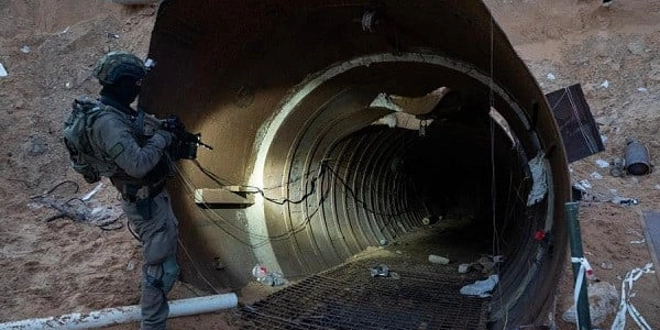The Israeli military has initiated a strategy to inundate the extensive tunnel networks of Hamas in Gaza amid escalating conflict, while the United Nations expresses concern over a looming humanitarian crisis in the area. This situation follows a dispute over funding for the UN’s main Palestinian aid agency, UNRWA.
Khan Younis, a major city in southern Gaza, has become the focal point of recent hostilities. Extensive damage has left large parts of the city in ruins, forcing residents to flee amid ongoing attacks, as witnessed by an AFP journalist. One woman shared her harrowing experience of fleeing under bombardment without basic necessities.
In another part of the city, Israeli soldiers showcased a tunnel to journalists, claiming it was used by Hamas for command purposes. Dan Goldfus, commander of the 98th Paratroopers Division, emphasized the significance of these subterranean maneuvers in the conflict, accusing the enemy of using civilian cover.
The Israeli Defense Forces, referring to the tunnel network as “the Gaza metro,” have started flooding these tunnels to counter Hamas’ underground capabilities.
The conflict, triggered by Hamas’s attacks on Israel on October 7, has resulted in numerous casualties, primarily civilians, based on an AFP tally using official Israeli data. Around 1,140 people died, and about 250 people, both foreign and Israeli, were taken to Gaza, with approximately 132 still there, including the bodies of at least 28 deceased individuals.
Israel’s extensive military response in Gaza has led to significant loss of life, with the majority being women and children, as reported by the health ministry in Hamas-controlled Gaza.
The UN has warned that the majority of Gaza’s population is displaced, and the humanitarian crisis will worsen if donors do not resume funding to UNRWA. Israel’s accusation that UNRWA staff participated in the October 7 attacks has led key donors, including the U.S. and Germany, to suspend funding.
Sigrid Kaag, the UN’s coordinator for Gaza aid, stressed the irreplaceability of UNRWA, which employs thousands. Other UN agencies have also voiced concern that defunding UNRWA could lead to a humanitarian system collapse in Gaza.
Regarding a ceasefire, Hamas confirmed receiving a proposal for a truce, currently under review. The plan involves phased measures, including the release of women and children hostages. Qatar’s Prime Minister expressed hope for a lasting ceasefire, while Israeli Prime Minister Benjamin Netanyahu firmly rejected releasing Palestinian prisoners or withdrawing Israeli forces from Gaza as part of any deal.
Regionally, concerns have grown about a broader Middle East conflict. U.S. President Joe Biden acknowledged deciding on a response to a recent drone attack in Jordan but emphasized avoiding a larger Middle East war. The U.S. and Britain have also targeted Yemen’s Iran-backed Houthi rebels, responsible for attacks in the Red Sea, with the U.S. military recently intercepting a Houthi missile over this crucial trade route.


